8 Things We Liked, and 2 We Didn't, About Fallout
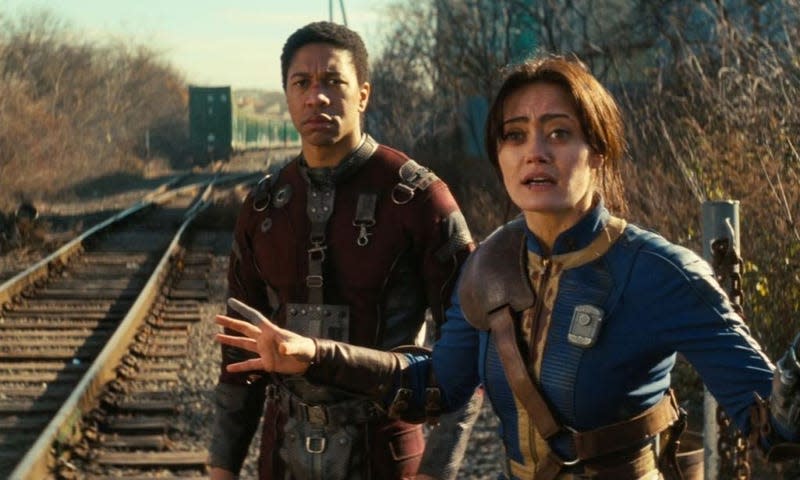
After what feels like a very long cryogenic sleep in an underground nuclear bunker, Amazon’s take on Fallout dropped like a bomb on Prime Video late last week—but whether or not you’re complete newbie to the world of Interplay and Bethesda’s legendary roleplaying games, or a series veteran, was it worth the wait? We think so—but here’s our spoilery take on what works, and what doesn’t.

We Liked: The Irreverent Tone (Mostly)
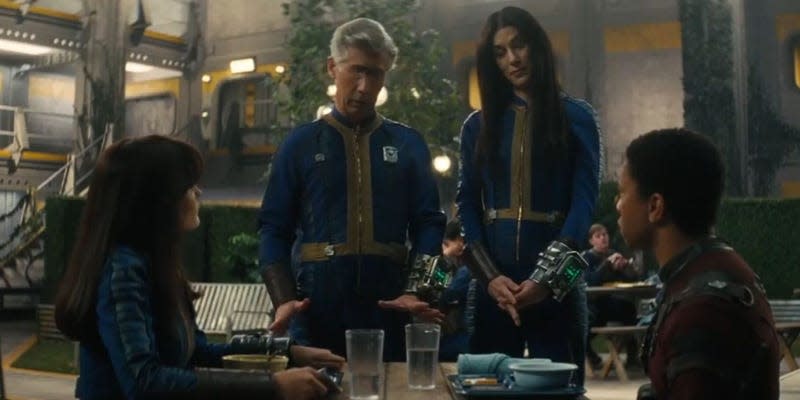
Fallout is not necessarily a goofy show; there are definitely moments where it pokes a lot of fun at itself and its characters, and sometimes, especially early on, it plays its hand a little too hard when it comes to its humor. It’s an inspired choice, but a surprising one, that the vast majority of the dialogue we hear through the imposing filter of the Brotherhood of Steel’s power-armor suits is mostly for shenanigans or characters stringing chains of expletives together. But Fallout’s casually dark approach to the absurdity of the world created in its apocalypse is ultimately a compelling one. The show eventually gives way to a more serious tones the more we learn about its world and mysteries, but it never stops having a sense of gallows humor—making its eventual critiques of the capitalistic forces that have shaped Fallout’s universe into what it is have a nice bit of bite to them.
We Liked: The Show’s Evolving Approach to Violence
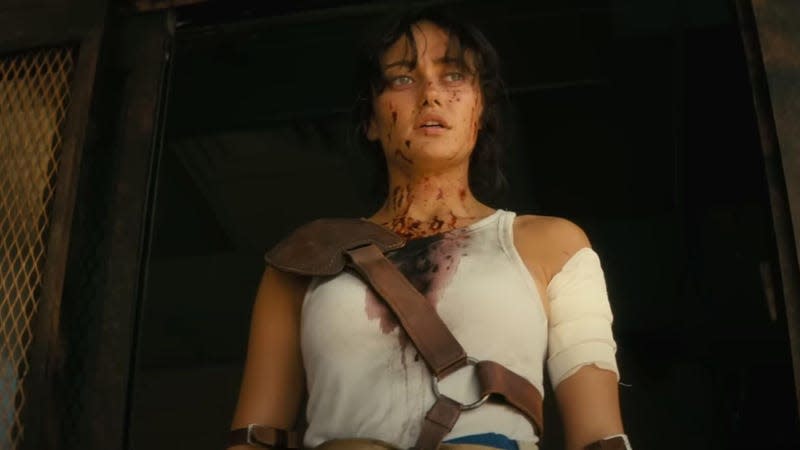
Speaking of its comical underpinnings, Fallout starts almost reveling in a sense of silly, gory glee—from the Raider attack on Vault 33 to the Ghoul’s shoot-out in Filly, the early episodes of the series really want you to know that a) it can show blood, b) it can show a lot of it, and c) look how silly it can be when someone’s entire torso explodes, and so on and so forth. Some of it can be taken as an homage to the VATS system from the games—a mode that slows down time for players to make percentage-based shots on different parts of an opponent’s body, often comically exploding those parts in meaty viscera while doing so—but for the most part it mostly feels like a show that’s really eager to show you it’s intended for adults, albeit ones with a penchant for gross-out humor.
But as the series progresses, so too does its use of violence—still stark and brutal, but less “ha ha that guy got his head turned to mulch” and more of a way to much more interestingly examine the different moralities at play in our trifecta of protagonists, and the moral core of the show itself (especially as Lucy gets more accustomed to conflict). Speaking of...
We Liked: Lucy’s Adoption of the Wasteland
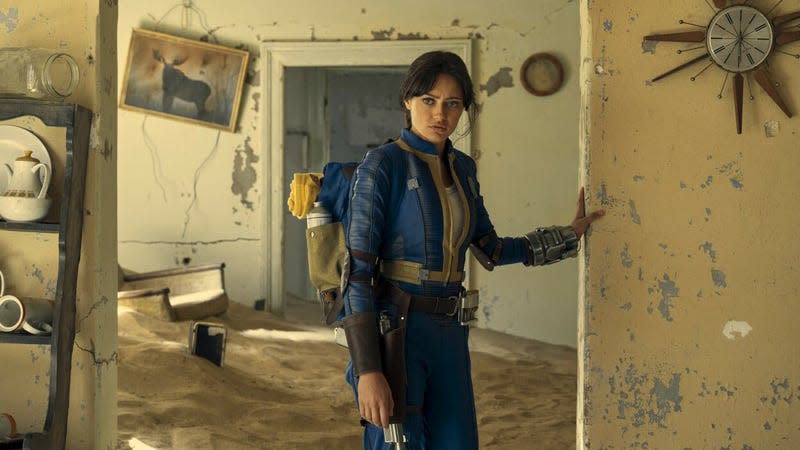
Lucy MacLean, played by Star Trek: Prodigy’s Ella Purnell, is the heart of Fallout—and Purnell delivers an incredibly charming and endearing performance that lets her turn between the comedic charm of being the naive Vault Dweller in a hostile post-apocalypse to the emotional heart of the show. Watching Lucy get swept up beyond her initial goal of rescuing her dad Hank in this world, and slowly adapting to it on her terms—but also embracing that it will change her, and she’d be foolish not to go with the flow—gives the series a really interesting narrative spine, especially when the general tone of the show is largely playing off Lucy’s journey too, peeling back the initial lighthearted irreverence to deliver a more thoughtful exploration of Fallout’s world.
We Liked: Maximus’ Surprising Selfishness
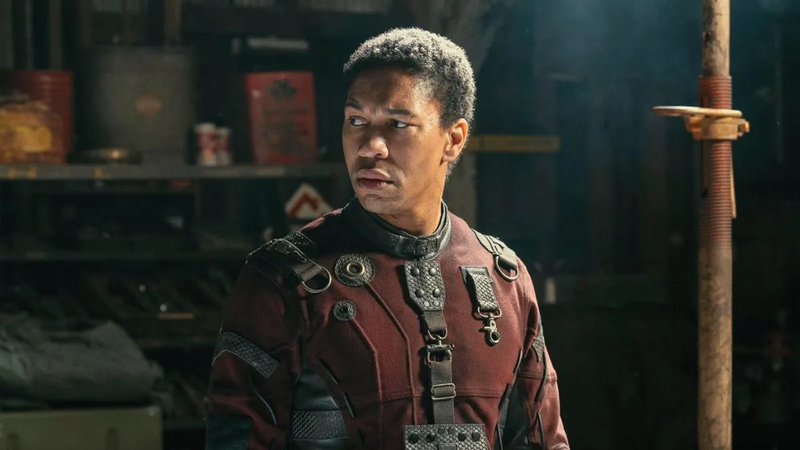
Aaron Moten’s Maximus isn’t an unlikable character, but he often makes choices to survive—from letting his assigned Brotherhood Knight, Titus, perish after an encounter with a radioactive bear mostly to get credit for their mission himself, or even in his adoption of Titus’ identity for much of the season—are presented in unlikable ways that are frequently fascinating.
That Maximus still is, at his core, a good person who wants to do good things for the world and the people around him make this compelling enough drama, but it’s especially apparent when he is thrust into more time with Lucy that makes for two similar, but still very different perspectives on Fallout’s wasteland. If Lucy is an extremely good person pushed to make tough choices by the world she’s put into, Maximus is one that is less pushed, and more capable of realizing that the world he’s spent his life being forged by can be manipulated into helping him survive to put that good back out there—and that there’s usually small moral prices to pay while doing so.
We Liked: The Ghoul’s Fine Line Between Terrifying and Sympathetic

Of all three main characters however, it’s Walton Goggins’ Ghoul—née Cooper Howard, as we learn delving more and more into his pre-war, completely-nosed life—that becomes the most fascinating. The Ghoul is unequivocally a central perspective figure of the series, but stands in strong contrast to Lucy and Maximus’ mostly good intentions—and for the most part of the season, stands against them as almost the closest thing the series has to a primary antagonist.
This means that not only is he a fascinating character to see have the perspective he does on Fallout’s world, as we learn more and more about his own place in it and the world before it, but it also means the Ghoul gets to just be frequently terrifying as a person. He’s so completely driven by his own bitter survival and vengeance, but also utterly ruthless in that drive, that he’ll stop at nothing or make no moral quandary about getting what he wants—often violently. Goggins gives Cooper/the Ghoul a ton of heart, but even as we learn more about him and sympathize with the person he’s become, metaphorically and literally, he remains this incredible threatening force in the show.
Once again, a special shout out to his entrance into the Brotherhood/New California Republic battle in the climax by basically getting his own version of the Rogue One Darth Vader hallway. It rules.
We Liked: The Smart Use of Music
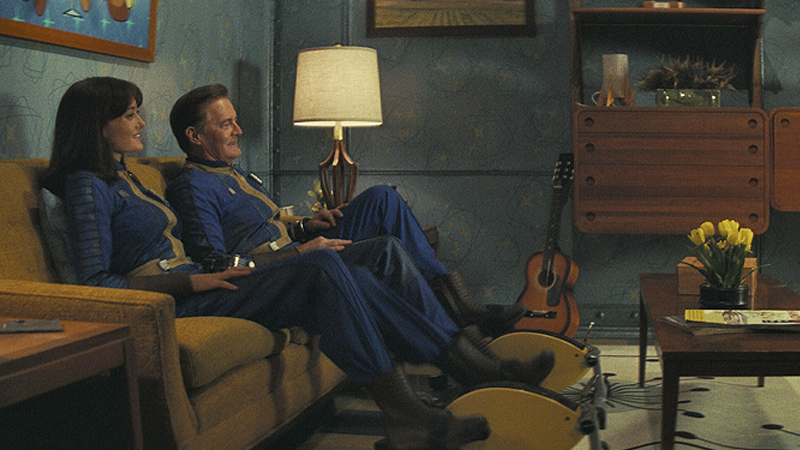
Fallout’s relationship to period jazz and space age music has always been an intrinsic element of the series—one hammered home especially so in the Bethesda era of Fallout games. So if the show had chosen to dole out period tunes across its big action sequences or tied into major plot beats, it could have and still felt faithful to the vibes of the games and their new-old aesthetic.
Thankfully, for the most part the show is actually quite selective—deploying tracks famously connected to the games like “I Don’t Want to Set the World on Fire” or “I Don’t Want to See Tomorrow” mostly as credits music, giving them an emotional catharsis connected to their respective episodes. There’s still a ton of it in there alongside Ramin Djawadi’s great original score, but it’s not hammered over your head.
We Liked: Keeping Vault 33 Key to the Show
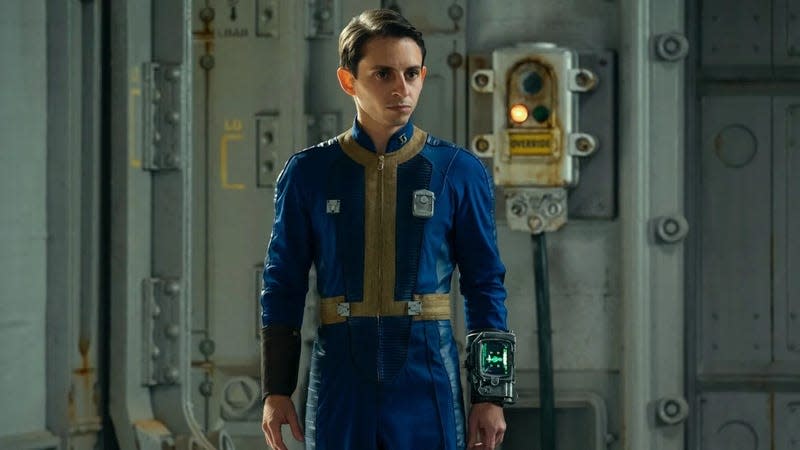
Another thing that would’ve been fairly easy: like a bunch of the Fallout games do, it would’ve been easy to have Lucy leave the vaults and never look back after the first episode. But the season keeps bringing us back to Vault 33, and particular to Moisés Arias as Norm, as we see him dig deeper and deeper into the ruling machinations of the Vault, and just how the raider attack blew open the mystery of its safety.
It’s not only great because we get to spend more time with the dwellers instead of simply just having most of them killed off in the opening episode and us forgetting about the survivors. But Norm’s surreptitious investigation of the Vault’s ruling council and the Overseer election process not only gives him a great arc over the season, but ultimately becomes a key spine the show builds its entire mystery around—making Vault 33 just as important to the rest of the show, even as it is by its very nature cut off from the rest of the narrative.
We Liked: The Twist
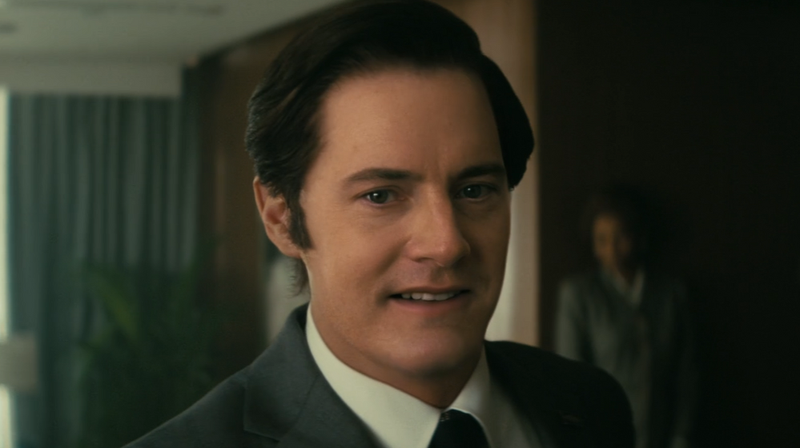
Throughout its first season, Fallout tees up what seemingly are a bunch of mysteries that are either not connected at all or by the loosest of threads—why is the Ghoul so fascinated when he learns Lucy’s full name? What’s going on with dwellers from Vault 31? How did Moldaver make her way from the pre-war days to lead the New California Republic, and just what did she need from Wilzig the Enclave defector? What really happened to Lucy’s mom, and will she be able to save her dad? Will Maximus be able to make his way back to Lucy—and away from the Brotherhood once and for all?
All this smashes together in the finale (appropriately called “The Beginning”) to reveal that actually everything is much messier, more personal, and interconnected than anyone thought. As Lucy comes face to face with what was always her goal from the moment she left Vault 33, we and she alike get to learn, thanks to a flashback to Cooper’s perspective, that it was Vault-Tec itself, spearheading a conglomerate of multiple pro-war companies, that fired the first bombs that set off the apocalypse, ensuring their products would be used. Also,along the way, Vault-Tec froze all of its managers—from the lowest assistants to the highest bosses—to control the world that came after the fallout and ensure that capital remains in their own hands. And not only that, we’ve met a bunch of those Vault-Tec staffers throughout the season, like Betty, and of course, Hank himself—revealed as the assistant to Cooper’s wife, Henry, in pre-war times.
It does a lot to make clear the way the show views Fallout’s world, while once again putting all three of the main characters together, if not ideologically or geographically, in just how related to all this mess they each are.
Okay so maybe don’t hit Kyle McLachlan with the CG-deaging-ray but still, in spite of that, it all works!
We Didn’t Like: The Finale Being a Big Exposition Dump
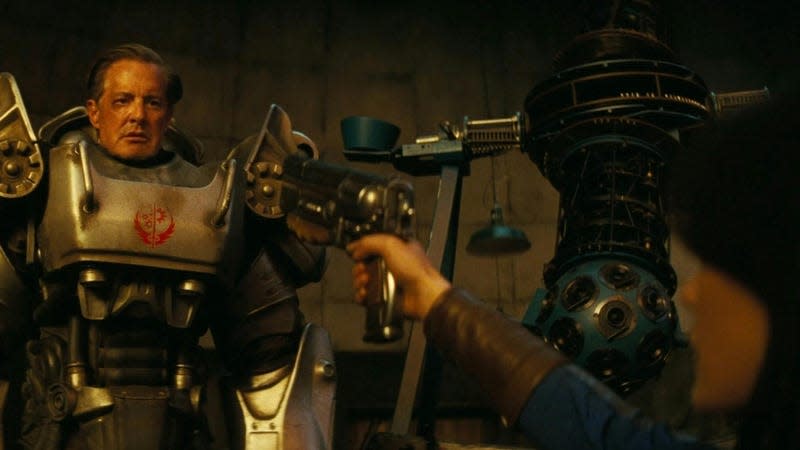
... that said, for as good the layers of the mystery behind Vault-Tec and the start of the War, and the MacLean’s personal connection to it all, actually is—it’s hard to get around the fact that the last episode of the season is mostly just Lucy standing between her father and Moldaver while the both of them exposit-via-flashback. There’s some good ways the episode breaks it up by giving us the action going on outside as the Brotherhood launches its assault on the NCR forces, but it’s both a lot to take in during the last episode, and also feels like all of the momentum built up ahead of the climax just comes slamming to a halt.
We Didn’t Like: The Binge Watch Rollout
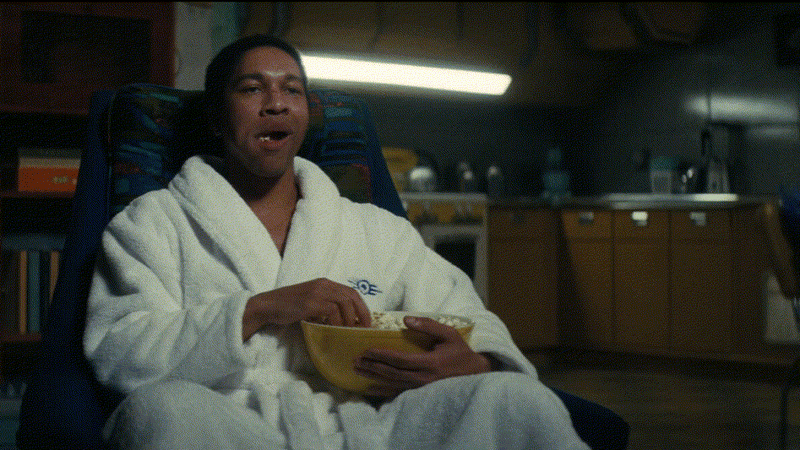
We already touched on this at length over the weekend, but aside from the general trend streaming platforms have made away from the model pioneered by Netflix in the early days of of the streaming age—few shows become appointment television when the appointment date is just one day instead of weeks and months—Fallout’s debut season feels particularly damaged by an all-at-once drop due to the structure of its mystery.
Being offered all the answers about why the Ghoul is the way he is, the reasons behind the Vaults’ existence, or even the real story behind the Great War pretty much from the get-go—because you have access to those answers in the last few episodes immediately—instead of it being teased out as it is dramaturgically within the flow of the show, week by week, means that you don’t really have the time to sit with it, or for the show to naturally develop a conversation around that mystery with its audience, because you have either already binged the whole season while others are parceling it out of their own accord.
It speaks to the show’s quality that it still hits its mystery beats really well in spite of this, but fingers crossed that any potential season two learns to take its time in the wasteland a little more preciously.

